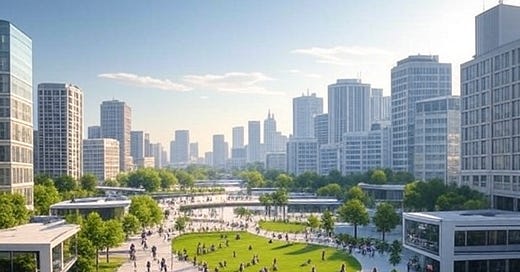We live in an era where digital connectivity is ubiquitous, opening a world of possibilities for online experiments to revolutionize how we understand social and political structures. Imagine a future where the boundaries between the virtual and physical blur, where internet-born communities become vibrant, functional socioeconomic systems. This idea is not just a distant dream: thanks to technological advances and a collective desire for freedom and innovation, it may be closer than we think.
The Internet as a Laboratory of Ideas
The internet is an unparalleled tool for designing and testing new models of social and political organization. By creating online communities based on diverse ideologies—such as libertarianism, communism, or entirely original cultural paradigms—people can experiment with forms of governance, economies, and social norms in a safe, controlled virtual environment. For instance, one community might establish a direct voting system for collective decisions, while another tests a digital barter-based economy. These “digital sandboxes” allow us to observe how different systems work in practice, free from real-world constraints.
The Rise of Post-Individualism
As we move toward an era marked by post-individualism, virtual communities gain prominence. In this new context, identity and belonging no longer depend as much on geographic borders or traditional ties but on virtual connections. A young person in Mexico might feel more connected to a global community of digital artists than to their physical neighborhood. These platforms offer spaces to find purpose and collaboration, linking individuals with shared interests worldwide. Thus, online communities have the potential to become pillars of our social fabric, fostering innovative collective identities.
Artificial Intelligence as an Ally
The integration of artificial intelligence (AI) takes these communities to another level. AI personalities can play key roles: from impartial moderators resolving disputes to advisors suggesting improvements to community rules. Imagine an AI analyzing behavioral patterns to propose conflict resolutions or personalizing each member’s experience. This technology not only optimizes the functioning of digital societies but also makes them more dynamic and effective.
Bitcoin and Blockchain: Decentralized Foundations
The impact of Bitcoin and blockchain technology on these communities is transformative. These tools enable decentralized, transparent management of transactions and information. Bitcoin could serve as the official currency of a virtual community, while blockchain ensures secure, verifiable records of every interaction. This paves the way for experimenting with alternative economic models, such as an economy without central banks or a system based on shared resources, free from the constraints of traditional financial systems.
From Virtual to Tangible
One of the most fascinating aspects of this evolution is how virtual communities could influence the physical world. Members might access real-world benefits—exclusive stores, coworking spaces, or even housing—through digital credentials or cryptocurrencies. For example, an online community could partner with local businesses to offer discounts to its members, creating a bridge between the digital and physical realms. This integration blurs the boundaries between both worlds, making virtual affiliations have a concrete impact on daily life.
Simulations for a Better Future
To assess the impact of different political or cultural systems, AI can simulate complex scenarios where human participation would be limited. By recreating policies, institutions, or traditions in virtual environments, we can gather valuable data on their viability. What would happen if a society eliminated traditional taxes and adopted a crowdfunding model? Simulations provide answers, accelerating the process of testing and refining innovative ideas.
Virtual Nations: The Next Step
The concept of virtual nations or civilizations takes these experiments to a larger scale. These self-governed, fully functional digital societies allow exploration of new forms of large-scale organization. “Virtual countries” could emerge with their own laws, economies, and cultures, serving as laboratories for solutions later applied in the real world. A libertarian virtual nation, for instance, could inspire reforms in physical governments by demonstrating the effectiveness of individual autonomy.
A Revolutionary Shift
The combination of technology and social experimentation is poised to transform how we conceive societies. Virtual communities, powered by AI and blockchain, offer a unique opportunity to refine socio-political models in ways previously unimaginable. By embracing this new era, we can build thriving digital societies that harmoniously integrate with the physical world, marking an exciting frontier for creativity and progress.
Toward a Connected Future
In conclusion, the fusion of online experiments with cutting-edge technologies has the power to reshape our world. By leveraging virtual communities, artificial intelligence, and blockchain, we explore unprecedented social and political possibilities, laying the groundwork for a future where freedom, innovation, and connectivity drive change. The path from the virtual to the real is not just a possibility—it’s an emerging reality that could redefine how we live, relate, and build tomorrow.












Share this post